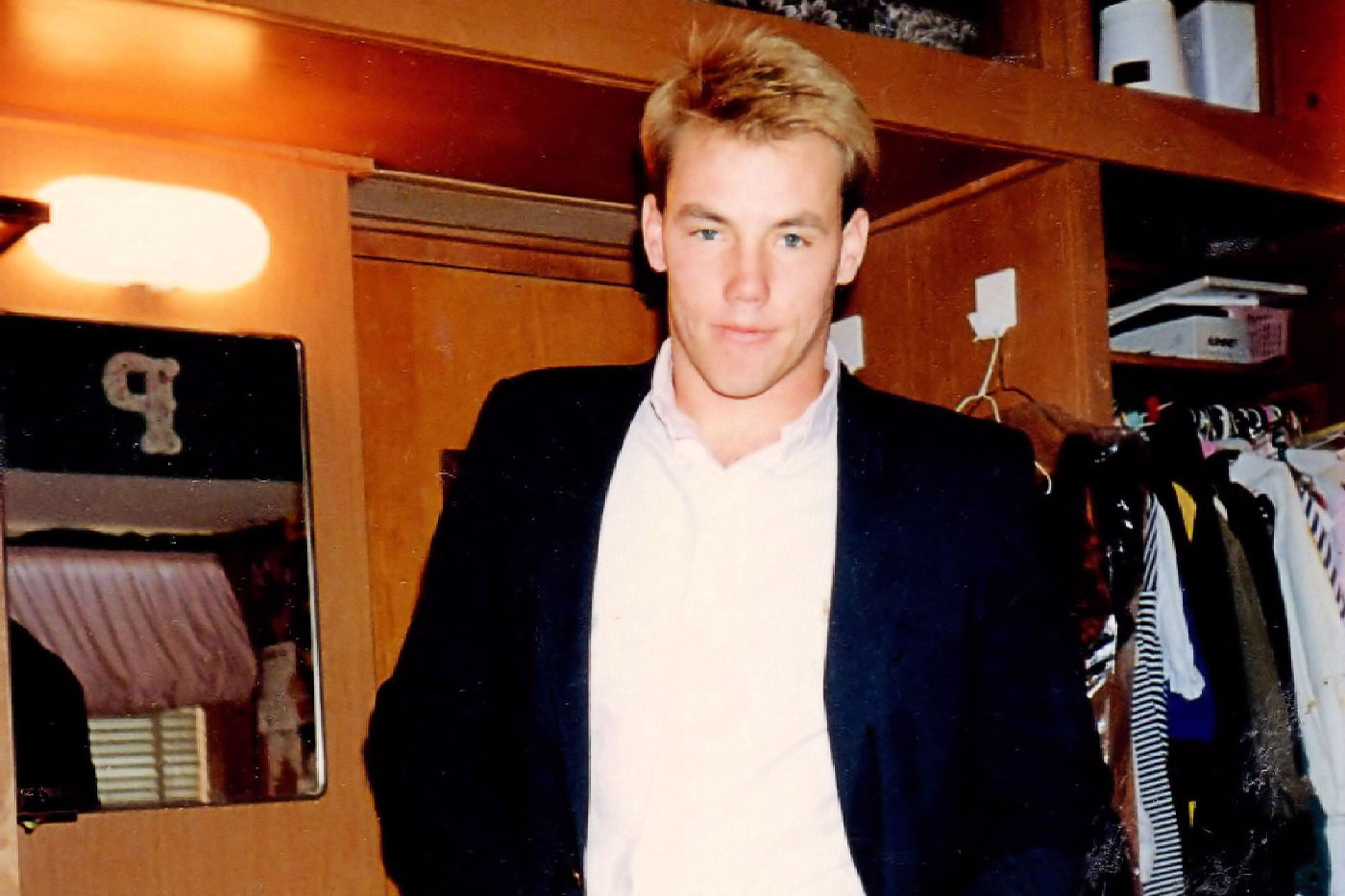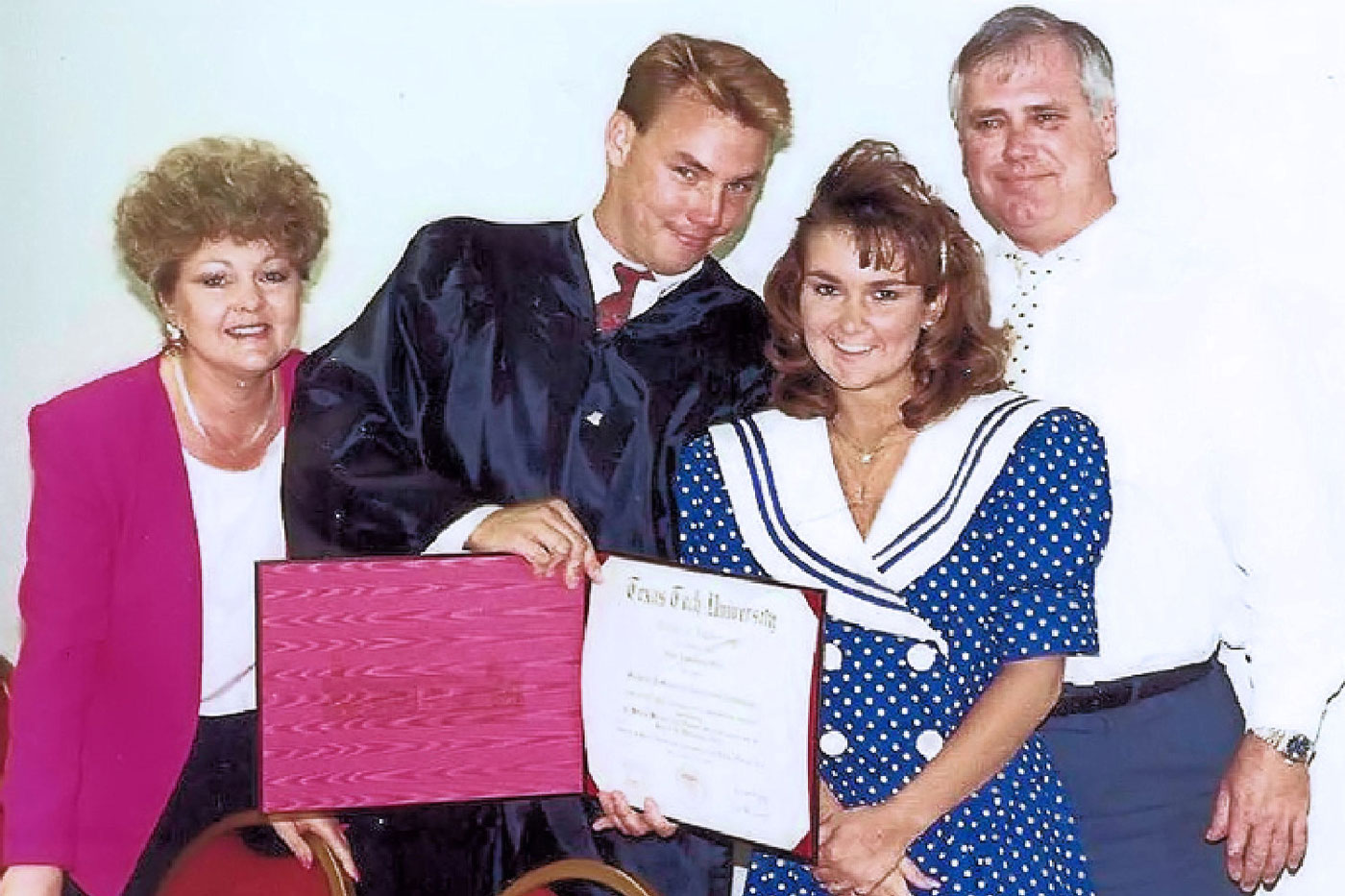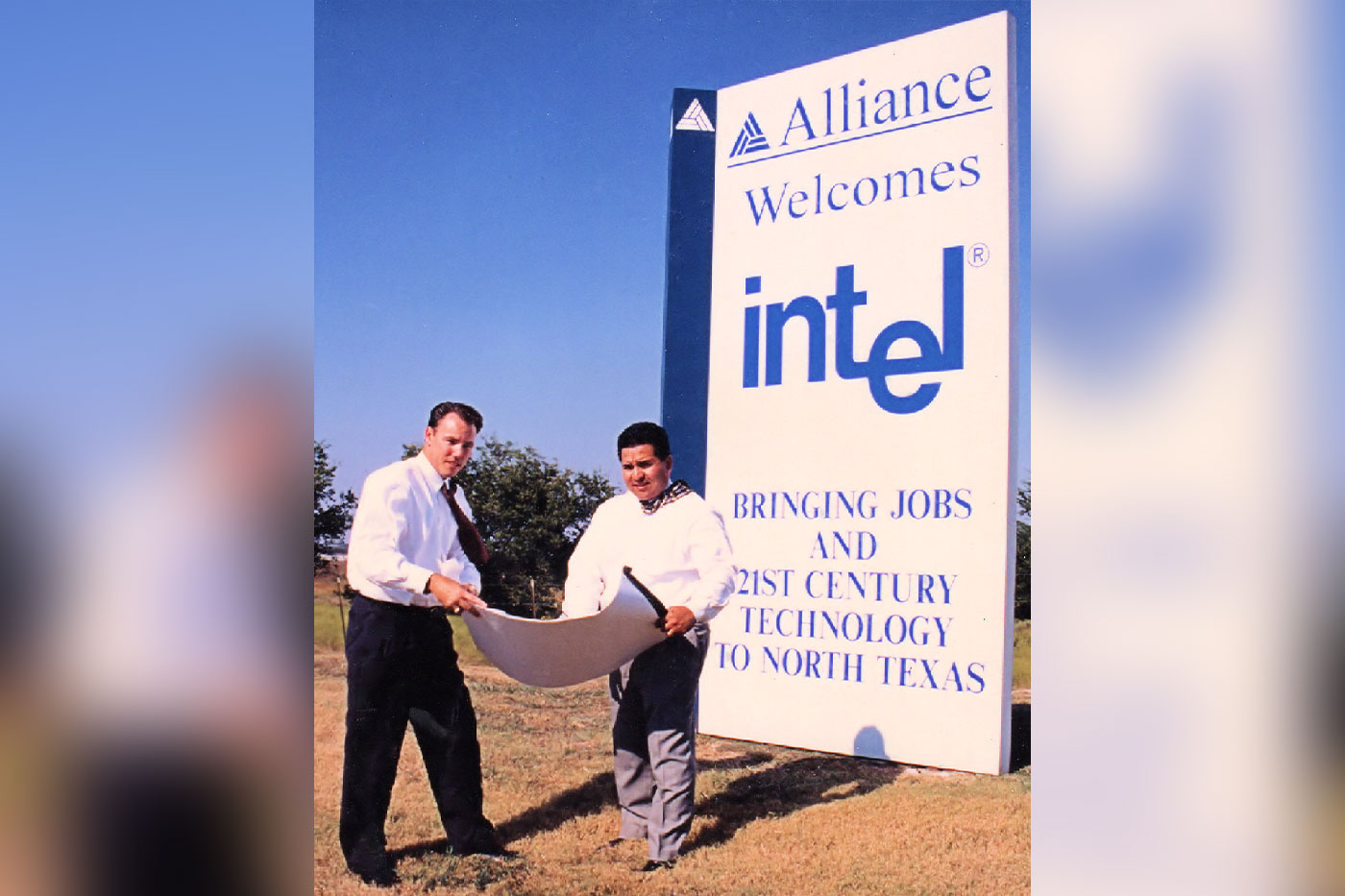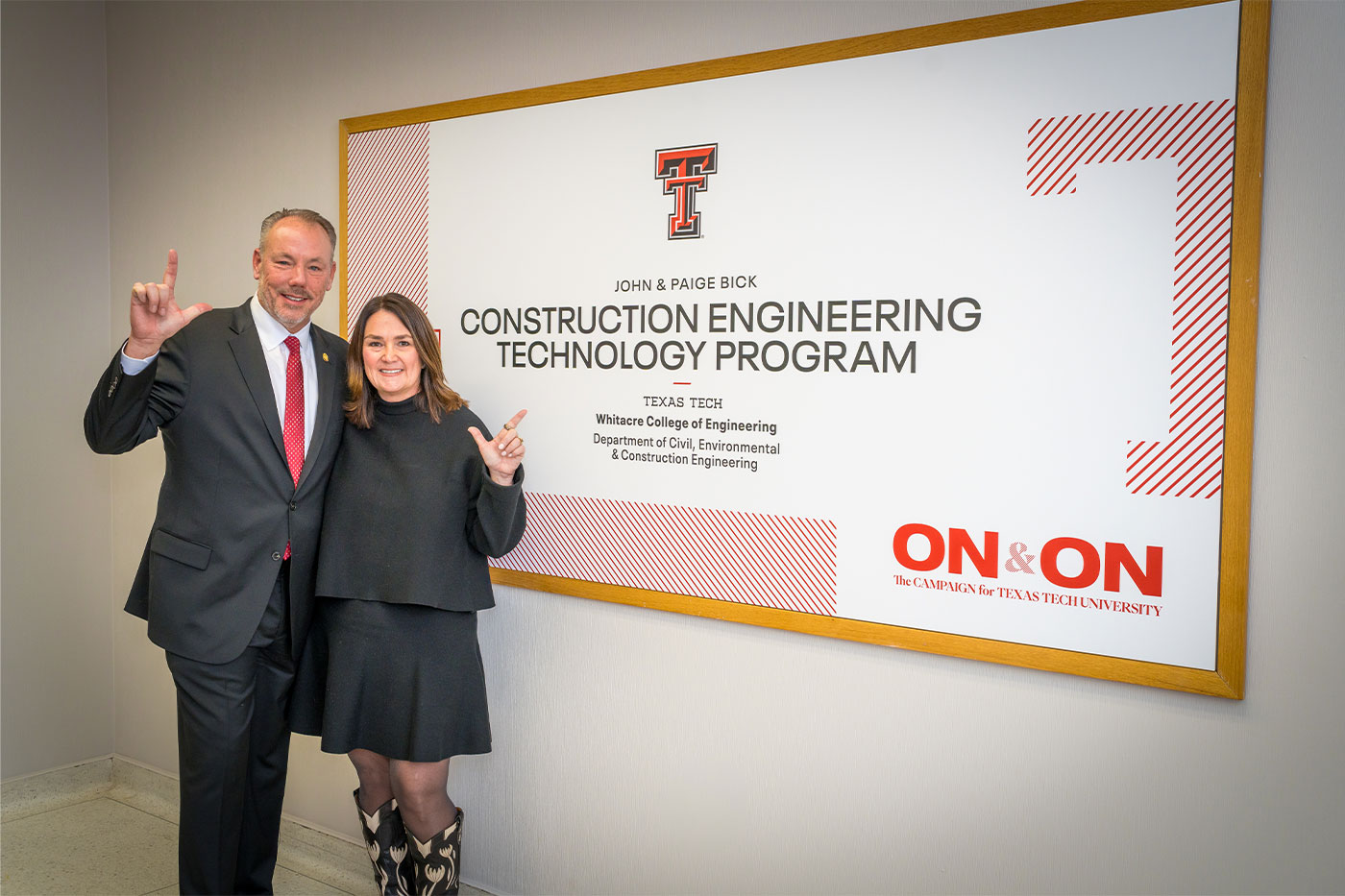From family and relationships to businesses and philanthropy, John and Paige Bick have been building greatness in all aspects of their lives.
From childhood, John Bick knew he was a builder by heart.
It was a bright, sunny day, and while John’s mother was doing laundry, she began lamenting that they did not have a clothesline she could use to dry the family’s clothes.
John saw his opportunity – his first foray into the construction industry.
“I thought to myself, ‘Well, I can build that!’” John said with a sweep of his hand and a nod of his head.
He convinced his mother to take him to the hardware store, where they stocked up on clothesline construction essentials: lumber, concrete and rope.
“I really thought about how to do this,” John said but admitted with a laugh, “although in application, when she hung those wet clothes on the clothesline, they all dripped down to the floor, and the whole thing nearly collapsed.”
While John’s first construction project was admittedly unsuccessful, his title of “builder” has become well-deserved since then.
Whether physical construction projects and business ventures or relationships, family and philanthropic endeavors, John has tapped into his foresight as a builder and found incredible success.
Laying the Foundation
Growing up in Midland, Texas, with a host of friends who all decided to attend the same university, going to Texas Tech University was not a difficult decision for John. The tough choice came when settling on a major.
He initially majored in computer science but quickly discovered that was not his path. In his first semester, he enrolled in a fundamental course for the major but struggled.
“My professor called me in after one of the [computer science] tests that I didn’t do very well on and asked what my major was. I said, ‘Well, it’s computer science.’ And he responded, ‘I suggest you change majors,’” John said with a grimace and a chuckle.
“And so, I actually changed majors that very day to construction engineering technology,” he continued.
There, John found his stride. In addition to being a member of Delta Tau Delta – a fraternity at Texas Tech – he was also involved in his major. He participated in the Associated General Contractors of America, a student organization in what is now the Edward E. Whitacre Jr. College of Engineering’s Department of Civil, Environmental & Construction Engineering.
Not only was he able to find a community within his degree program, but John also felt the construction engineering technology degree specifically set him up for success in his future career.
The program was designed to allow students to apply their knowledge of engineering design to project development and execution in a real-world setting – a skill, among others, that John has found to be immensely beneficial as he has progressed through his career.


“When I walked through the halls of Texas Tech as a very young 17-year-old and first-generation college student in the construction engineering technology program, I had no idea just how deeply my education would shape my future,” John said. “The skills I gained, the professors who mentored me, and the lessons in critical thinking, complex problem solving and leadership to navigate the challenges of a fast-paced industry provided the foundation for my career.”
Setting the Frame
When John graduated from Texas Tech in 1989, he had offers to work as a project manager for different construction firms, but the lifestyle of someone in that role was not attractive to him.
He had recently met and begun dating Paige Hampton, the woman who would become his wife two years later. The couple met at Texas Tech, where Paige was studying interior design in the College of Health & Human Sciences. She went on to complete her degree at the University of North Texas.
Project managers in the industry often lived out of suitcases, traveling from job site to job site and spending more time in a hotel than in their own homes.
He knew this lifestyle would make his budding relationship with Paige difficult to maintain, so he began looking for other opportunities. One of which would take his professional direction in a trajectory he had never imagined and would elevate his career to heights he could not have dreamed.
At the time, Paige’s father was the vice president at Texas Utilities Electric Company and encouraged John to interview for a position with the company. He started as a customer service representative in Mesquite, Texas, shortly after.
“They offered me the job. Although it wasn’t in construction engineering, and it was a lot less pay than the other offers,” John shrugged, “it’s what I decided would be best.”
His instincts had struck again. Instincts and a Texas Tech education.
“A Texas Tech education does not just teach us the skills to succeed. It gives us the tools to lead, to innovate and to make a real impact on the world around us,” John said. “My success is not only a result of the hard work and determination that I put in but also of the world-class education and support I received from this incredible university.”
Equipped with his own hard work, dedication and the toolbox filled with leadership, innovation and desire to make an impact, John quickly rose through the ranks in the company.
In 1992, he was transferred to Fort Worth as a senior account manager responsible for AllianceTexas, a 27,000-acre master-planned industrial, mixed-use and residential development anchored by the world’s first industrial airport. He also served as city manager for the suburban cities surrounding Fort Worth, overseeing regulatory and rate filings, as well as maintaining relationships with the city council, mayor, city staff and influential community business leaders.

John transferred to Dallas four years later as a key account executive with TXU Electric. A year later, he was promoted to manager of strategic accounts, responsible for the company’s largest customers, which represented $2.2 billion in revenue. Under John’s leadership, TXU Electric was recognized by the Edison Electric Institute as the most outstanding National Accounts organization for two consecutive years.
In 2000, John was named director of strategic business development at TXU Energy Services, the utility’s unregulated affiliate. There, he directed the origination, development and closing of long-term comprehensive energy outsourcing agreements with strategic accounts.
Through his career growth, John’s affinity for building was a key component in his progress.
“Well, as a builder, it doesn’t necessarily have to be the building of materials,” John said. “It could also be the building of a company, or it could be building relationships. And as a builder, you have to think four and five steps ahead, planning, budgeting and anticipating what comes next. I’ve used those skills throughout my life, even building our family and my business relationships.
“Specifically for energy,” he continued, “I’ve looked at building the connections of how the grid works and how customers use power, how they can use it more efficiently and effectively, how electricity is generated, how it’s delivered. All of those things are critical in today’s world.”
Creating the Structure
The business relationships John had built, along with his deep understanding of his industry and the connections within it, became an integral part of the next step in his career.
When Enron Corporation, a Houston-based energy company, filed for bankruptcy in 2001, it reverberated throughout the energy sector, forcing multiple companies, including TXU Electric, to restructure.
This offered John the opportunity to take a risk he had been considering for a while – stepping out on his own. He had an idea, he knew it would work, and he knew now was the time to take a chance.
John knew some of the founders and original investors in Priority Power. Established in his hometown of Midland in 2001, Priority Power was serving as an electricity aggregator. However, John saw the potential for so much more.
He set up a meeting at the Petroleum Club of Midland with a former TXU colleague and a group of oil and gas executives who had founded Priority Power. Over lunch, he laid out his business plan for the company.
They liked what they saw.
With a firm handshake, PPM Dallas, Ltd. was born with John as its managing principal. The new firm would serve as the growth engine driving the implementation of John’s business plan.
While this was the best news John could have hoped to hear, it did not come without risk. Like any entrepreneurial venture, John was expected to have his fair share of skin in the game. In this instance, it came in the form of equity in the business.
“[After the meeting] I immediately went home to Paige and said, ‘Well, I think I’m going to do this, although my contribution for equity is that we’re going to have to live back when we were in college and eat beans and rice,’” John said raising his eyebrows at his wife.
“It was a lot, in all honesty,” Paige responded, “We had just bought a new house. We had three small kids. At times, we had to borrow money, but we made it work, partially because of the beans and rice, but I always believed in him.”
Paige’s belief was well-founded because the combined business flourished under John’s vision and leadership. They began adding additional services, including natural gas supply management, utility bill auditing and processing, rates and tariff analysis, regulatory advisement and energy efficiency services. In late 2010, John and a partner negotiated a management buyout and acquired Priority Power.
Priority Power evolved to act as an advisor and advocate for commercial and industrial clients, assisting them in purchasing and managing power. It functions as what John describes as an outsourced energy department for these companies by negotiating with power and utility companies to reduce their costs, ensure they receive power when needed and support their business growth.
John led the company as the managing principal through several milestone moments, including a recapitalization in 2019. In 2020, he was named chairman of the board and chief commercial officer of Priority Power. John stepped down as chairman in September 2024 but remains with the company as a senior advisor.
Under his leadership, Priority Power grew exponentially to become one of the largest independent providers of turnkey energy management services for more than 8,500 commercial and industrial customers across the U.S. and nearly $1 billion of private infrastructure developed for its customers – a far cry from the leap of faith he, Paige and their family made 20 years prior.


“When you start a business, or at least for me, my experience was it was scary, but I knew I had to succeed,” John said. “You have to stay focused and build a business plan. You have to map out how you are going to grow this company, how you are going to get customers, and how you are going to retain those customers that you get.
“You have to measure your progress to know where you are going. Have a plan and stick to the plan, but you also have to be able to navigate the challenges that come with it and pivot if necessary.”
Finishing Touches
Through his more than two decades of experience in leadership at Priority Power, John has a firsthand view of the challenges facing the energy industry and the clients it serves. One he finds looming is a rising population and deteriorating infrastructure.
“Our cities are growing, our infrastructure is aging and we are constantly presented with new challenges such as energy independence, electrical grid resiliency and the exponential growth of hyper-scale data centers to power the new world of AI – all of which demand innovative solutions,” John said.
“Construction engineers are essential in creating resilient infrastructure that can withstand the test of time,” he continued. “They are the ones who will design smarter, more energy-efficient cities, craft solutions for sustainable construction, and ensure that our future is built with safety and environmental stewardship at the forefront.”
The construction engineering technology program laid the foundation for his professional success. Now, more than ever, he sees a need for more students with that skill set to start careers in the industry.
John is not alone in that assessment.
The Bureau of Labor Statistics projects that overall employment in construction and extraction occupations is expected to grow faster than the average for all occupations from 2023 to 2033. Texas, with its booming infrastructure and residential development, is one of the fastest-growing construction markets in the nation, underscoring the need for a workforce equipped with both practical construction skills and advanced technological expertise.
Unfortunately, the construction engineering technology program was discontinued between John’s graduation in 1989 and early 2025 – something John knew as he serves as a member of the Whitacre College of Engineering Dean’s Council.
As a builder, John saw another opportunity in front of him, and he and Paige had a chance to help build this program back to its former glory.
One of the largest barriers to starting or reinstating a new program at a university is financial. It can cost millions of dollars to hire personnel, acquire new or refurbish old facilities and equipment, support student scholarships and more.
After discussions with university and college leadership, John and Paige knew this was how they could help and give back to a program that had been so instrumental in their lives.
In February 2025, the couple made a $5 million gift to the Whitacre College of Engineering to revitalize the program. To honor their generosity, the program, which is in the approval process, will be named the John & Paige Bick Construction Engineering Technology (CET) Program.

“This is more than just the revival of a program; it is an investment in students, in industry and in the future of our communities,” John said. “By bringing back this program, we are ensuring that Texas Tech remains a leader in developing the next generation of construction professionals. We love Texas Tech, we’ve been blessed with success over the course of my career and our lives, and we wanted to give back. Paige and I are incredibly proud to be a part of this milestone.”
The Bicks’ gift will provide comprehensive support for the Bick CET Program by funding scholarships, lab renovations, equipment maintenance and replacement, faculty and instructor support and other program needs in the Department of Civil, Environmental & Construction Engineering.
The new program will complement the construction engineering program in the same department. Whereas the construction engineering program is more math- and theory-intensive, emphasizing design and structural analysis, the Bick CET Program will prepare students to effectively plan, manage and execute construction projects by combining engineering principles with practical construction techniques.
“The ripple effect of this investment will be felt not only within our college but across industries and communities that our graduates will one day serve,” said Roland Faller, dean of the Whitacre College of Engineering. “From its early days to now, Whitacre College has evolved in raising new technologies and methodologies to meet the challenges of our ever-changing world. With this generous gift, we envision a future where our department leads in sustainable construction practices, advanced engineering, technologies and groundbreaking research that addresses global challenges.”
This program seeks to meet the needs of both students and industry. The construction industry is booming in Texas, and by focusing on the specific demands of Texas’ diverse infrastructure and residential and commercial development projects, the Bick CET Program will address regional workforce needs and create pathways for students to achieve professional certifications and career advancement.
Texas Tech is striving to fill a unique niche by bridging the gap between hands-on construction skills and advanced technological training to give students a competitive edge in the job market. In return, the program is structured to provide industry with career-ready graduates who are prepared for roles in project management, site supervision and construction operations.
“There are some students who would be just fine doing design and sitting at a desk, where others want to get their hands dirty, and they want to get out there and want to see, ‘How does that design move from the computer to the blueprint to actually physically turning dirt and putting up steel?’” John said.
“And so it’s really a preference thing,” he continued. “But what I’ve seen is that when Tech discontinued this program, in my view, it was a loss for the university, and it was a loss for industry as a whole because engineers need to also think about, ‘In the real world, how does this design get built?’ The environment out in the field changes and you have to be able to make changes on the fly. And so that component, making things a reality, I think is really special.”
While this is the largest gift John and Paige have made to Texas Tech, it is by no means the first. For the past 36 years, the Bicks have consistently supported the university through the Texas Tech Alumni Association, Texas Tech Athletics, the Whitacre College of Engineering and the Jerry S. Rawls College of Business.
John and his business partner at Priority Power established the Priority Power Management Scholarship Endowment in Rawls College in 2011 to support students in the Area of Energy Commerce & Business Economics. Additionally, John and Paige established the Paige & John Bick Family Scholarship Endowment in 2013 to support Whitacre College students.
They had seen the impact college loans had on their own lives. They knew they not only wanted to support their children, Halle, Haiden and Kenedi (who are all graduates of Rawls College) in their pursuit of higher education, but they wanted to do so for others as well.
“When John graduated in ’89 he was handed his little coupon book to pay for his school loans, and we were a little shocked at how much it was,” Paige said. “So we said once we started having children, that would be our number one goal to be able to pay for their education at Texas Tech. And then once we were able to do that, we were ready to help other kids have the same opportunity to at least have a semester they didn’t have to pay for.”
Each semester, the students who they support with scholarships send thank-you letters to the couple, showing their gratitude for their generosity, sharing about their collegiate experience and explaining the impact this scholarship has had on their lives.
For both John and Paige, receiving those letters is the moment they know they are making a true difference.
“We read every one of them,” Paige said. “It’s incredible hearing where they’ve come from and what their background is and where they are going.”
John concurred, “When we receive the scholarship letters from students who have received scholarships from us, it really warms our hearts, understanding what their backgrounds are and listening to what their stories are. It really brings it home what these contributions and these investments are.”
With their contributions and investments, John and Paige have built something truly special at Texas Tech. Just as John knew from a young age, they are builders at heart, and what they have built at Texas Tech will continue to elevate this campus, fuel academic excellence and transform the lives of students for generations to come.
“We grew up with humble means, and we made a life for ourselves by loving our family, loving our girls and showing them the right way in life,” John said. “Along the way, we happened to be very blessed with success. And I think the community as a whole, as you raise your family, it’s important to understand that your success is largely a part of the environment that you’re operating within. We wanted to share that with others who helped us along the way.”
The Bick CET Program received approval from the Texas Tech University System’s Board of Regents during the March 6 meeting and is pending approval from the Texas Higher Education Coordinating Board as of April 2025.

